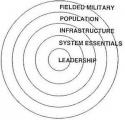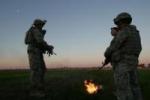Saudi Arabia is our Ally, but they are not our Friend
Saudi Arabia is a kingdom, and as such, not only do they not share the national interests of the United States, they do not even possess national interests at all. There is only one kind of interest in Saudi Arabia, and that is the interest of the King. It is extremely important for the U.S. to understand this simple point as it strives to establish a stable, Shia dominated, democratic Iraq on The Kingdom’s northern border, because that is the last thing that King Abdullah wants to see happen there.
There are arguably three things that King Abdullah fears more than anything else, and these fears shape the essence of Saudi policy. The first of these fears is a reemergence of Iran as a major regional power with normalized relations with the U.S. and the West; the second fear is a rise in power of Shia Muslims relative to that possessed by Sunnis; and the third great fear of the King of Saudi Arabia is of his own populace. These fears shape the policies of Saudi Arabia, and they shape the nature of the Saudi aspect of the Saudi-U.S. relationship. The U.S. aspect is shaped by oil; the need to keep the flow of Saudi oil moving to U.S. consumers, and also the terms of long-standing contracts that control how the profits of that oil market are distributed.
So long as the U.S. understands that these three great fears shape the policy of Saudi Arabia above all things, there is no reason end the alliance. The essence of the relationship however is not about alliance, it is about reliance, and therein lays the problem. The U.S. appears to confuse its need for Saudi oil with a need for sustaining the Saudi Governance in its current state; a position so out of context with everything that the U.S. stands for, that it can only be explained by an almost drug addict-like reliance on sustaining that flow of oil. The King, on the other hand, is equally reliant on the power of the U.S. to sustain the chokehold that he and his family have on the wealth and power of Saudi Arabia. A relationship this dysfunctional cannot help but produce unfortunate results.
A strong case can be made that the U.S. – Saudi relationship, more than any other thing, is the Decisive Point for achieving stability in the Middle East. In military terms, a Decisive Point is “A geographic place, specific key event, critical system, or function that allows commanders to gain a marked advantage over an enemy and greatly influence the outcome of an attack.” While that is a very tactical perspective, the potential from getting this relationship right could produce a domino effect of stability throughout the entire Middle East, and it is high time to stop allowing one man’s personal, self-serving interests to prevent that from occurring.
The Saudi populace, like so many in the Middle East, is in a state of emergent insurgency. It is essential to understand three elements of governance in order to deal appropriately with an insurgent populace: Effectiveness, Goodness, and Legitimacy. Effectiveness is an objective assessment of how well a government performs. Goodness is a subjective assessment through the eyes of the governed populace as to how they feel about their government and their options for effecting legal change. Legitimacy is the perceived source of power that creates and sustains a government. Of the three, it is a failure of “Goodness” that leads to insurgency; but it is the real or perceived source of “Legitimacy” that determines who the insurgent attacks.
The disgruntled segment of the Saudi populace understands full well that they must first break the support of the U.S. government to their own before they can have any hope of achieving good governance at home. Osama bin Laden, who shares this goal of disrupting U.S. control of the region and taking down the Saudi royals, makes this point very clear as his al Qaeda Network wages a very state-like unconventional warfare campaign to synergize the Sunni insurgencies of the region. This explains why 15 of the 19 attackers of 9/11 were Saudis. This explains why some 40% of the foreign fighters and the vast majority of suicide bombers in Iraq have been Saudis. To cast these men simply as “Terrorists” while accurate is both unfair to them and dangerous to the U.S. These men do not take these extreme measures to destroy America, they take these extreme measures to restore and preserve Saudi Arabia.
To be clear, this is a popular uprising, and not state sanctioned terrorism. It is highly unlikely that the King sanctions these attacks on U.S. interests. Far better to have the insurgent segment of his populace focused on frustrating U.S. interests in the region than on attacking the Saudi Government directly; particularly if this provides an outlet to his populace’s frustrations and prevents or slows the establishment of a Shia dominated Iraqi democracy and keeps the Iranians in check. After all, it is in his interest.











 either one will get you details.
either one will get you details.


Bookmarks